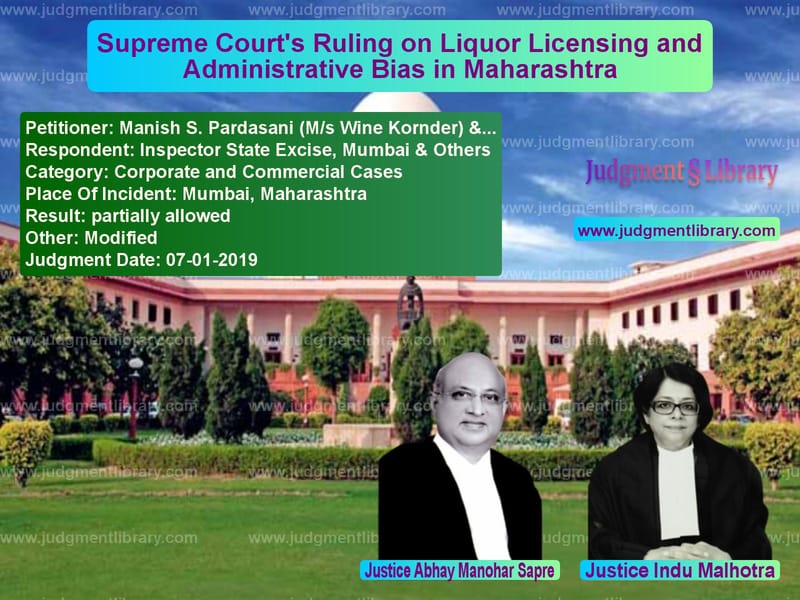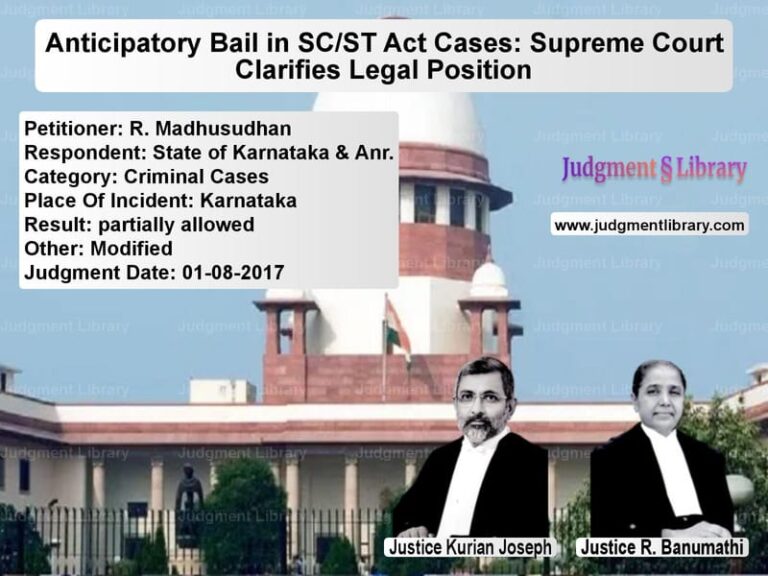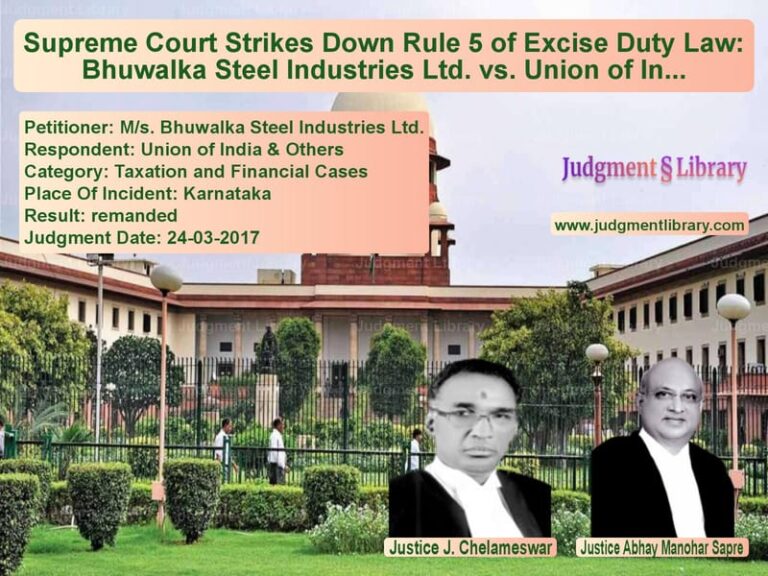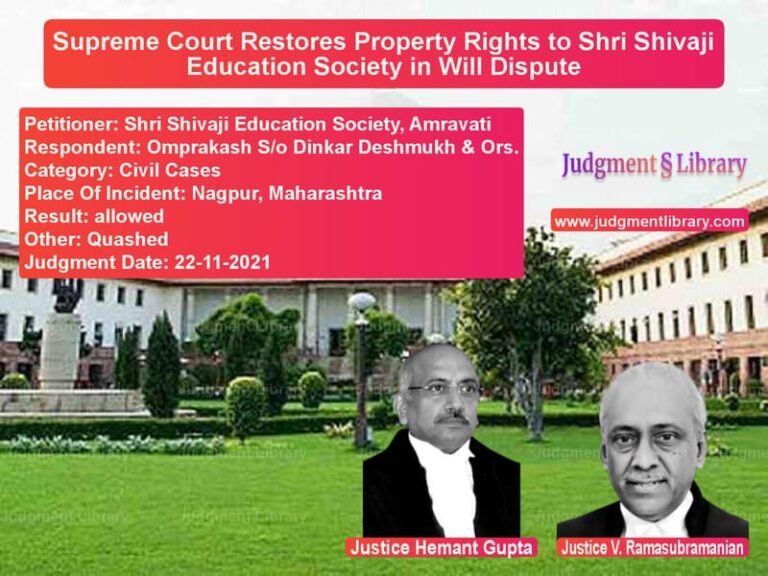Supreme Court’s Ruling on Liquor Licensing and Administrative Bias in Maharashtra
The Supreme Court of India recently delivered a significant judgment in the case of Manish S. Pardasani (M/s Wine Kornder) & Others vs. Inspector State Excise, Mumbai & Others. The case revolved around the sealing of liquor shops in Mumbai suburbs due to alleged violations of the Maharashtra Prohibition Act, 1949. This ruling has significant implications for liquor licensing regulations, administrative fairness, and appellate procedures in excise-related matters.
Background of the Case
The dispute began when multiple liquor shop owners in Mumbai, holding valid licenses under the Maharashtra Prohibition Act, 1949, were accused of selling liquor through home delivery services, including telephonic orders and internet transactions. The State Excise Department alleged that this practice violated the terms of the licenses and various provisions of the Act, including Sections 23, 24, 65(a)(e), 73, 74, 81, 83, and 90.
On August 10, 2018, an FIR was registered against the shop owners, leading to the immediate sealing of their premises by the State Excise officials. The affected liquor vendors challenged these actions, arguing that the orders were arbitrary, unlawful, and violated their rights.
Legal Issues and Arguments
Petitioners’ Arguments
- The liquor shop owners contended that the sealing of their premises was done without following due process.
- They argued that they were not granted a fair hearing before the action was taken, violating principles of natural justice.
- The show cause notices issued on August 27, 2018, were vague and did not provide specific details about the alleged breaches.
- The liquor shop owners highlighted that the Commissioner of State Excise had issued oral orders to subordinate officers, leading to actions without proper documentation.
- They further argued that the actions of the Commissioner reflected an administrative bias, making it impossible for them to receive a fair hearing.
Respondents’ Arguments
- The State Excise Department defended its actions by stating that the liquor vendors were violating licensing terms by delivering alcohol outside their licensed premises.
- The authorities argued that interim orders, including ex-parte stay orders, were necessary due to the urgency of the violations.
- The respondents denied allegations of bias and claimed that all actions were taken per the provisions of the Maharashtra Prohibition Act.
Supreme Court’s Observations
The Supreme Court, comprising Justice Abhay Manohar Sapre and Justice Indu Malhotra, analyzed the matter in detail and made the following key observations:
- “Government agencies must act transparently and fairly. Actions taken without due process violate the principles of justice.”
- “Oral orders cannot be the basis for administrative actions. Any decision affecting the rights of individuals must be properly documented and justified.”
- “The Commissioner of State Excise acted beyond her jurisdiction by issuing ex-parte orders without giving affected parties a chance to respond.”
- “While the authorities have the power to regulate liquor sales, their actions must be within the framework of law.”
Final Verdict
The Supreme Court ruled:
- The sealing of liquor shops without proper hearings violated due process.
- The interim orders issued by the Commissioner were quashed.
- All adverse remarks made by the Bombay High Court against the Commissioner of State Excise were expunged.
- The pending appeals before the Commissioner should be decided without bias within three months.
Implications of the Judgment
- The ruling reinforces due process in administrative actions, ensuring that government agencies cannot take arbitrary decisions.
- The Supreme Court limits the discretionary powers of excise officials in sealing liquor shops without proper legal procedures.
- The judgment highlights the importance of maintaining transparency in government licensing and regulation.
- Future disputes related to liquor licensing must be handled through legal and well-documented proceedings.
The Supreme Court’s decision serves as a landmark ruling in liquor licensing laws, setting a precedent for administrative accountability and fair trial rights for business owners.
Petitioner Name: Manish S. Pardasani (M/s Wine Kornder) & Others.Respondent Name: Inspector State Excise, Mumbai & Others.Judgment By: Justice Abhay Manohar Sapre, Justice Indu Malhotra.Place Of Incident: Mumbai, Maharashtra.Judgment Date: 07-01-2019.
Don’t miss out on the full details! Download the complete judgment in PDF format below and gain valuable insights instantly!
Download Judgment: Manish S. Pardasani vs Inspector State Exci Supreme Court of India Judgment Dated 07-01-2019.pdf
Direct Downlaod Judgment: Direct downlaod this Judgment
See all petitions in Contract Disputes
See all petitions in Corporate Compliance
See all petitions in unfair trade practices
See all petitions in Judgment by Abhay Manohar Sapre
See all petitions in Judgment by Indu Malhotra
See all petitions in partially allowed
See all petitions in Modified
See all petitions in supreme court of India judgments January 2019
See all petitions in 2019 judgments
See all posts in Corporate and Commercial Cases Category
See all allowed petitions in Corporate and Commercial Cases Category
See all Dismissed petitions in Corporate and Commercial Cases Category
See all partially allowed petitions in Corporate and Commercial Cases Category







